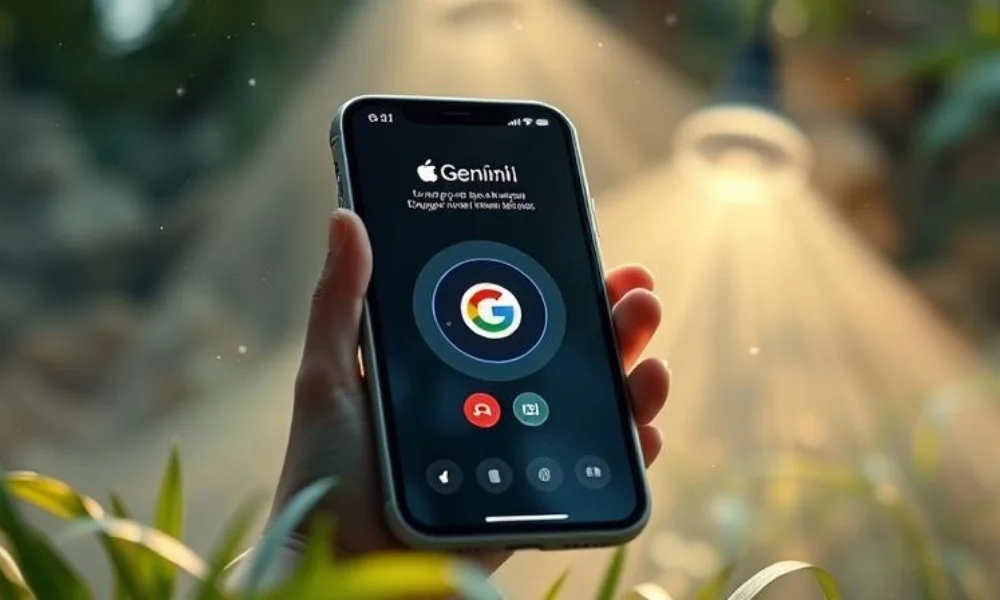Artificial Intelligence
Why Google’s iPhone AI Push Could Reshape Apple’s Ecosystem
Google’s Gemini AI on iPhones is shaking up Apple’s ecosystem, challenging Siri, and influencing user preferences. Will this force Apple to upgrade its AI strategy or restrict Google’s AI features?

Smartphones are evolving fast, and artificial intelligence is leading the way. Google’s latest push with Gemini AI could change how iPhone users interact with artificial intelligence. This move challenges Apple’s ecosystem, forcing changes that could reshape the future of iOS.
I’ll break down how Google’s iPhone AI impact could lead to Siri upgrades and even a potential Google-Apple partnership. This shift is more than just competition, it could redefine AI on smartphones.
What Is Google’s iPhone AI Push?
Google is bringing Gemini iPhone integration through its official app, offering advanced AI features. This move puts pressure on Apple, raising questions about the future of Siri and iOS AI.
We’ll explore market trends, X reactions, and the bigger picture behind this shift. Will this push force Apple to innovate or lead to unexpected collaborations? Let’s dive in.
Google’s Big Move: What Is Gemini AI Doing on iPhones?
Gemini AI: A Quick Background
Google’s Gemini AI is an advanced AI model designed to handle text, images, and even coding. It competes with ChatGPT and other AI tools, making it a powerful assistant. Unlike Siri, Gemini offers real-time responses, creative writing, and deep AI-driven insights.
How Is Google Integrating Gemini into iOS?
Google is rolling out Gemini iPhone integration through its official Google app. This lets iPhone users access AI-driven features, including:
-
Smart text generation for emails, social media, and content creation.
-
AI-powered search with conversational responses.
-
Personalized recommendations based on user behavior.
This move positions Gemini as an alternative AI assistant, directly competing with Siri.
Why Is Google Targeting Apple Users?
Google sees iPhone users as a massive untapped market for AI. By offering Gemini on iOS, it gains access to millions of high-value users who rely on AI for daily tasks. This strategy also challenges Apple’s AI dominance, putting pressure on the company to respond.
If iPhone users prefer Gemini over Siri, Apple might be forced to accelerate AI development or even consider deeper integration with Google’s AI services. Could this lead to an unexpected Google-Apple partnership? We’ll explore that possibility next.
Could Gemini AI Force Apple to Upgrade Siri?
Siri’s Limitations vs. Gemini’s Capabilities:
Siri has been Apple’s voice assistant for over a decade, but it struggles with complex conversations and real-time AI-generated responses. It mainly relies on pre-set commands and web searches, making it feel outdated compared to modern AI tools.
On the other hand, Gemini AI offers context-aware replies, deep learning capabilities, and multi-modal understanding. It can handle text, images, and even code, making it a far more advanced AI assistant than Siri. With Gemini iPhone integration, users now have a powerful AI alternative.
Apple’s History of Slow AI Upgrades:
Apple has taken a cautious approach to AI, often lagging behind competitors like Google Assistant and ChatGPT. While Google rapidly improves its AI models, Apple has been slow to integrate machine learning advancements into Siri.
Historically, Apple’s AI updates have been incremental. It introduced on-device processing for Siri and minor improvements, but it still lacks the deep learning power seen in Google’s AI ecosystem.
Could Gemini Push Apple to Rethink Siri?
With Google’s iPhone AI impact becoming more visible, Apple faces two choices:
-
Upgrade Siri aggressively to match Gemini’s intelligence.
-
Limit Google’s AI access on iPhones to maintain control.
If iPhone users start preferring Gemini over Siri, Apple may be forced to rebuild Siri from the ground up. This could lead to a major shift in Apple’s AI strategy, potentially bringing more AI-driven features to iOS.
Social Media Reactions: What Are Users Saying?
X Reactions: iPhone Users Debate Gemini’s Presence
Social media platforms, especially X (Twitter), have been buzzing with mixed reactions about Google’s AI on iPhones. Some users love the Gemini iPhone integration, praising its superior AI capabilities. Others are questioning why Siri still feels outdated in comparison.
Here’s a look at common reactions:
-
Positive: “Gemini on my iPhone is a game-changer. Siri feels like it’s stuck in 2015.”
-
Negative: “Why do I need Google’s AI on my iPhone? Apple should just fix Siri already.”
-
Neutral: “Apple better have a big AI announcement soon, or Gemini will take over.”
AI Divide: Praise vs. Criticism:
Some users are excited about having more AI choices on iPhones, while others feel Apple should prioritize Siri upgrades instead of allowing Google’s AI to dominate. This divide highlights a growing demand for better AI assistants on iOS.
How Social Media Sentiment Could Influence Apple:
Apple closely monitors market trends and user feedback on social media. If the backlash against Siri grows and more users start embracing Gemini iPhone integration, Apple might be forced to respond with major Siri upgrades.
Could this be the wake-up call Apple needs to take AI seriously? We’ll explore that possibility next.
Business Angle: Could Apple and Google Collaborate?
Google’s Deep Integration into Apple’s Ecosystem:
Apple and Google are rivals, but Google’s services are deeply embedded in iPhones. Google Search, Maps, and YouTube are default apps for millions of iOS users. Even Siri relies on Google Search for web queries, making Google an essential part of the Apple ecosystem.
Now, with Gemini iPhone integration, Google is expanding its AI reach. This raises a big question—could Apple and Google collaborate on AI instead of competing?
Could AI Lead to a Google-Apple Partnership?
A Google-Apple partnership in AI might seem unlikely, but it could benefit both companies. Apple struggles with AI development speed, while Google has a mature AI ecosystem. A collaboration could bring Google’s AI power to Apple devices without forcing Apple to build everything from scratch.
Some possibilities include:
-
Apple licensing Gemini AI for advanced Siri features.
-
Exclusive AI features for iPhone users powered by Google.
-
Joint AI research to enhance user experiences on both platforms.
Keeping Competition Alive While Benefiting Both Sides:
A partnership wouldn’t mean the end of competition. Apple could still develop its own AI, but working with Google could fill the AI gap in the short term. Meanwhile, Google would gain access to millions of iPhone users, strengthening its position in the AI market.
Could this be a new era of AI collaboration between Apple and Google? Or will Apple double down on its own AI strategy? Let’s look at the market trends.
Market Trends: What This Means for Apple’s AI Future
Apple’s AI Patents and Acquisitions – Is It Preparing a Response?
Apple has been quietly investing in AI. It has filed patents for AI-driven assistants, speech recognition, and generative models. The company has also acquired AI startups, signaling that a Siri upgrade or a new Apple AI tool could be on the way.
Apple’s AI-focused acquisitions in recent years include:
-
Xnor.ai – Edge AI processing for on-device intelligence.
-
Inductive – AI-powered automation tools.
-
WaveOne – AI-driven video compression.
These moves suggest that Apple is working on its own generative AI but keeping it under wraps for now.
Will Apple Launch Its Own Generative AI in the Next iPhone?
Leaks and rumors suggest that the next iPhone could feature on-device generative AI. This means Apple might introduce an AI-powered Siri or a new AI tool built directly into iOS. Unlike Google, which relies on cloud AI, Apple prefers on-device AI for privacy reasons.
Some expected AI features in future iPhones could include:
-
Smarter Siri with natural conversation abilities.
-
AI-powered photo and video editing tools.
-
Personalized AI recommendations integrated into iOS.
If Apple announces a major AI breakthrough, it could reduce reliance on Google’s AI, keeping its ecosystem closed and self-sufficient.
How Apple Might Monetize AI Differently from Google?
Unlike Google, which earns money through ads and AI subscriptions, Apple follows a different strategy. Apple’s AI could be a premium feature, bundled with iCloud, Apple One, or new hardware.
Possible ways Apple could monetize AI:
-
AI-enhanced iPhones with exclusive features.
-
Siri Pro as a subscription-based AI assistant.
-
AI-driven services in Apple’s ecosystem (Apple Music, Photos, or Health).
Apple’s approach to AI monetization could set it apart from Google, offering users privacy-focused AI tools instead of ad-driven AI models.
With all these changes coming, the AI battle between Apple and Google is just getting started. The big question remains—how will users respond?
The Bigger Picture: What Does This Mean for iPhone Users?
Will Apple Users Start Preferring Google AI Over Siri?
Apple users are loyal, but Siri’s limitations are frustrating. With Gemini iPhone integration, many users might find Google’s AI more helpful than Siri. If Gemini offers better answers, smarter automation, and more useful features, users may switch to Google’s AI tools instead.
If more iPhone users start using Gemini for voice commands, searches, and daily tasks, Siri could become less relevant. This would be a major shift in the Apple ecosystem, potentially affecting user behavior for years.
Could This Change Default App Choices on iPhones?
Right now, Apple controls the default app experience on iPhones. Safari, Apple Maps, and Siri are tightly integrated into iOS. But if Google AI proves superior, users may start replacing Apple’s default apps with Google’s services.
Possible shifts include:
-
Google Assistant replacing Siri for voice commands.
-
Chrome and Google Search becoming the go-to browsing tools.
-
Google Photos gaining popularity over iCloud Photos for AI-powered features.
If this trend continues, Apple might lose control over its ecosystem’s core user experience, forcing it to rethink its AI strategy.
Could Apple Block or Limit Google’s AI Features to Protect Its Ecosystem?
Apple has a history of restricting third-party apps to maintain control over iOS features. If Gemini AI becomes too powerful, Apple could limit its access or make it harder to use on iPhones.
Apple could take actions like:
-
Blocking Gemini from deep iOS integrations.
-
Restricting default app changes to keep Siri as the primary AI assistant.
-
Pushing its own AI as a competitive alternative to Gemini.
If Apple chooses to restrict Google’s AI, it might frustrate users who prefer Gemini over Siri. This could create pressure for Apple to release a better AI solution rather than just blocking competition.
Conclusion:
The arrival of Gemini AI on iPhones is a game-changer. It highlights Siri’s weaknesses, raises questions about Apple’s AI future, and could lead to a Google-Apple partnership or rivalry. The competition is heating up, and iPhone users stand to benefit from smarter AI tools.
Apple can’t afford to ignore AI industry shifts. If Google’s AI keeps improving, Apple users might switch to Google’s tools and weaken Apple’s hold over its ecosystem. This could force Apple to rebuild Siri from the ground up or introduce a next-gen AI assistant.
What Do You Think?
Will Apple finally take AI seriously, or will users move toward Google’s AI tools? Let me know your thoughts in the comments and share this article with fellow tech enthusiasts!
-

 Artificial Intelligence8 months ago
Artificial Intelligence8 months agoWhat is Artificial Intelligence? A Comprehensive Guide for Businesses and Enthusiasts
-

 Artificial Intelligence6 months ago
Artificial Intelligence6 months agoHow to Use Grok AI: A Complete Guide
-

 Artificial Intelligence8 months ago
Artificial Intelligence8 months agoUnlocking the Power of Artificial Intelligence Tools
-

 Artificial Intelligence7 months ago
Artificial Intelligence7 months agoWhat is DeepSeek? Revolutionizing AI with Cutting-Edge Solutions
-

 Artificial Intelligence3 months ago
Artificial Intelligence3 months agoAI Technologies in Warehouse Automation:
-

 Artificial Intelligence4 months ago
Artificial Intelligence4 months agoMeta’s AI Push: The Standalone Assistant App Set to Rival ChatGPT
-

 Artificial Intelligence3 months ago
Artificial Intelligence3 months agoHow Artificial Intelligence is Revolutionizing Logistics:
-

 Artificial Intelligence3 months ago
Artificial Intelligence3 months agoPredictive Analytics for Demand Forecasting:


